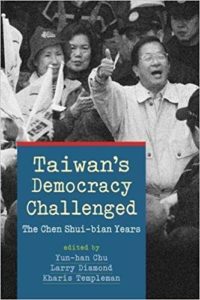We stand together with @Int_IDEA and other global democracy organizations to express our solidarity with the people of #HongKong, who are valiantly defending rights that are part of our common human heritage. https://t.co/fIvzhKyflu
— NEDemocracy (@NEDemocracy) August 14, 2020
The State Department announced on Thursday that it was designating the U.S. headquarters of a Chinese government educational organization as a diplomatic mission, in the latest action by the Trump administration to limit official operations by China in the United States, The Times reports:

National Endowment for Democracy (NED)
The headquarters, called the Confucius Institute U.S. Center, in Washington, manages and provides funding for Chinese-language teachers and classes across the country. The university-level classes are operated out of 75 entities called Confucius Institutes, and the kindergarten through 12th-grade classes are run out of 500 entities called Confucius Classrooms…..
A 2018 report on Chinese government and Communist Party influence operations in the United States done by the Hoover Institution and the Asia Society had details on the work and structure of the Confucius Institutes. It said the organization in Beijing that oversees the institutes, the Hanban, which is under the Education Ministry, has ties to the Communist Party’s Central Committee. The Hanban typically gives a $150,000 start-up grant to an American university, with grants of $100,000 and $200,000 per year afterward, the report said. It gives $50,000 in initial funding to secondary schools and $15,000 per year afterward.
“Most troublesome are two provisions in the Hanban contracts with U.S. host institutions: One forbids the C.I.s from conducting any activities that contravene Chinese law, while the other requires that the enabling contract remains confidential, making oversight by the academic community difficult,” the report said.
Confucius Institutes are a key element in the CCP’s United Front operations, according to a recent report from the Australian Strategic Policy Institute (ASPI), which are in turn a major facet of what the National Endowment for Democracy (NED) calls China’s sharp power.
 In the months since the January 2020 elections, Taiwan has provided another impressive demonstration of its democratic resilience, capacity, and unity of purpose in the face of dissembling and disinformation from Beijing, notes Kharis Templeman, advisor to the Project on Taiwan in the Indo-Pacific at the Hoover Institution on War, Revolution, and Peace, and co-editor (with Yun-han Chu and Larry Diamond) of Taiwan’s Democracy Challenged: The Chen Shui-bian Years (2016).
In the months since the January 2020 elections, Taiwan has provided another impressive demonstration of its democratic resilience, capacity, and unity of purpose in the face of dissembling and disinformation from Beijing, notes Kharis Templeman, advisor to the Project on Taiwan in the Indo-Pacific at the Hoover Institution on War, Revolution, and Peace, and co-editor (with Yun-han Chu and Larry Diamond) of Taiwan’s Democracy Challenged: The Chen Shui-bian Years (2016).
As for the future of Taiwan’s democracy, its resilience in 2020 should not be allowed to obscure some serious, persistent weaknesses, he writes for the NED’s Journal of Democracy:
Its media environment is still excessively sensationalist, hypercompetitive, and unprofitable, making it vulnerable to outside manipulation. Its campaign-finance laws remain lax and poorly enforced. Civil society and religious groups are lightly regulated, and many operate outside state scrutiny. Partisan divisions continue to hamper the development of a unified response to PRC threats. Above all, Taiwan’s economy remains deeply intertwined with that of mainland China and vulnerable to economic coercion. Shoring up these weak spots will require a tricky balancing act: Taiwan must guard against dangers emanating from CCP-linked groups but also continue to uphold civil liberties, equal treatment under the law, and free cross-Strait exchanges even for Taiwanese who favor unification. RTWT







